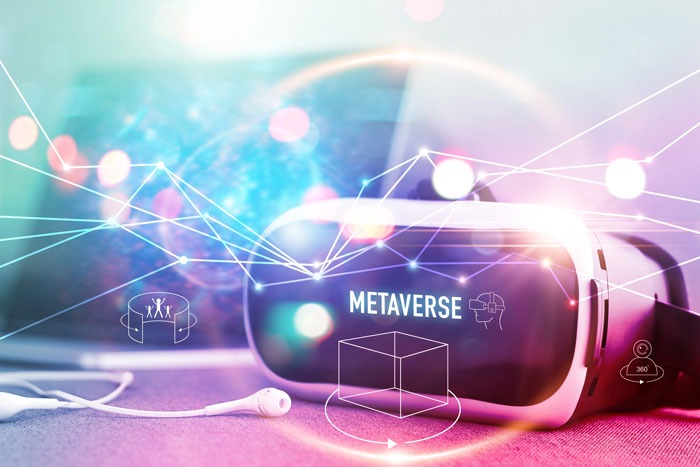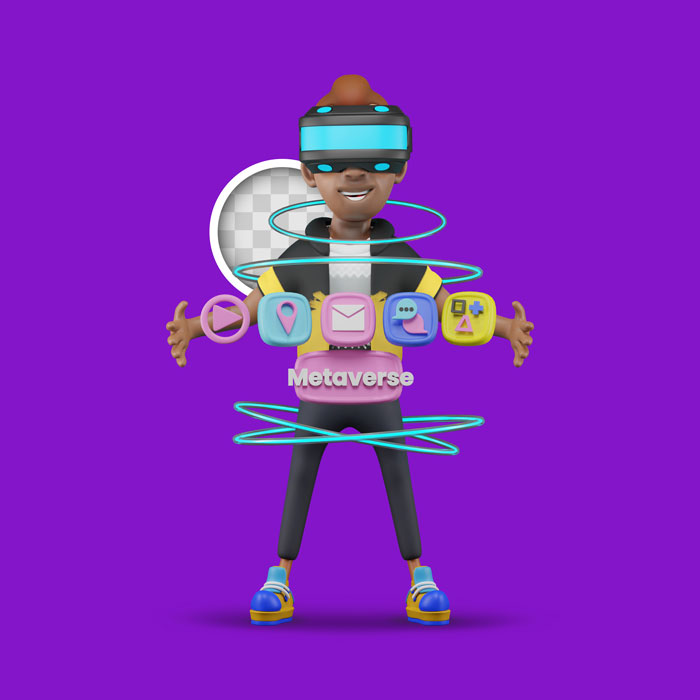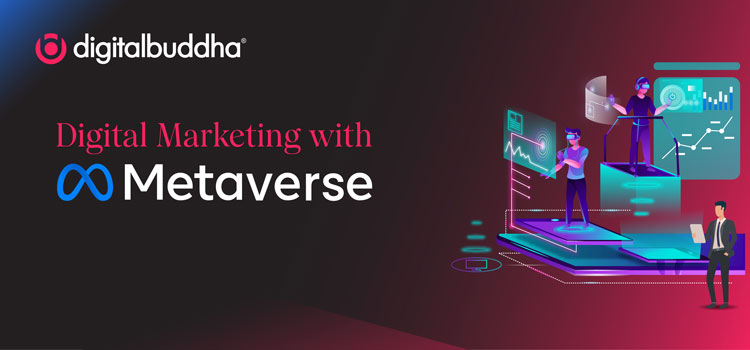Metaverse!
Ever curious where this word comes from? The sources say the term “metaverse” was coined by Neal Stephenson in his 1992 science-fiction novel “Snow Crash.” The word is a portmanteau of the prefix “meta” (meaning “beyond”) and “universe.”
At the beginning of the year 2022, Metaverse rushed into our lives, as another technical advancement.


What is Metaverse?
Technically, the metaverse is not a technology, but a concept that uses various technologies. It can mean any virtual environment.
In the real world, metaverse can reach more people. For the same reason, brands are shifting to this new environment where they can maximize the profit from advertising.
Video games, social spaces, and even shops are all possibilities in this digital world. You can host a virtual party, buy and sell items, meet up with people or work, or just be social. This presents tremendous opportunities for brands. The Metaverse is a digital world that people can explore, socialize and transact. It has several features that make it very attractive for marketing purposes. For example, the Metaverse provides a persistent, augmented reality space where objects look true to life and people can interact with others in the same room or from the other side of the world – no matter what device they are using. Your creativity is the limit.
Digital marketing is one of the most critical factors in driving traffic to your website, increasing sales, and generating leads. Social media platforms such as Twitter, Facebook, and LinkedIn have been used to promote digital marketing strategies for many years. With virtual reality on the rise, you must explore this new frontier and figure out how best to incorporate these platforms into your digital marketing strategy.
Digital Marketing In Metaverse
In this universe, marketing success is determined by three keywords: creative, engaging, and interactive.
- The Chances Of Gamification
The gamification of marketing is the most important digital strategy for your metaverse. Gamification has evolved from a trend to an established marketing method and it’s not going anywhere. It’s all about creating a game-like experience, adding value and motivation to your products and services, and making customers feel like they’re part of something fun.


On metaverse. “Louis the Game” is a digital game released by Louis Vuitton to commemorate its founder’s 200th birthday. Users were asked to collect 200 birthday candles travelling through multiple worlds with Vivienne, their house mascot.
The key benefit of the metaverse is the promising chance of building a long term relationship with customers through simple fun activities. The ability to host events and virtual parties at your metaverse spot will help you to build bonds that last beyond the meta world. If the campaign you run can deliver an immersive feeling to the customer can help you to attract more active users to the arena in a limited period.
- An Outrageous Boost To Your Visibility
The requirement of visibility is not a new element in the marketing sector. Moreover, the primary objective of any marketing is to gain the visibility of a potential audience. The chances of visibility can be in two levels at the beginning of the metaverse. The word of mouth and in action.
When you have an exciting idea, you’ll be known all over the world. The campaigns here are becoming more and more popular. You will reach more audiences regardless of whether they are in the metaverse. If you can successfully deliver intense curiosity, people will find their way to you in no time. Your visibility can be multiplied by the exponentially increasing number of users, limitless opportunities for brands, and easily applicable ideas that are impossible in the real world.


- The Flourish Of Virtual Influencers
Imagine you hiring a popular influencer for your marketing without paying a single penny and the influencer exclusively works for your brand alone.? Yes, this can happen in the metaverse. You can make your own influencer without paying them a salary.
At the present time, there are only 150 virtual influencers, but this number is expected to continue rising. Featured in multi-brand campaigns, Daisy was dressed in Calvin Klein and Tommy Hilfiger clothes by the online luxury discount site Yoox in 2018. Also in South East Asia, Puma debuted Maya, a virtual influencer. In addition to Dior, other brands have created digital avatars of real people, such as Angelababy, a Chinese actress who attended Dior’s pre-fall show in Shanghai.
- Continuous Experimenting and Evolution
Just like any other platforms metaverse will also undergo continuing experimenting and evolution according to the user requirements. To establish steady growth you can start the metaverse journey at the earliest possible. By this time you will know the character of the platform and the behaviour of your customers and audience in the metaverse.
Challenges Of Digital Marketing In The Metaverse
- Intellectual or creative property ownership: getting the sole ownership of your work can be challenging, especially in the condition where your creator is an AI-powered source.
- Data privacy is still questionable in the metaverse. There are multiple issues raised so far in the account of data privacy.
- Digital assets ownership and control: any ownership and the control of the asset will be challenging to verify. So far only crypto transactions are happening in the metaverse.
- Metaverse is free space: Image protection needs to be taken seriously by brands. Metaverses provide a lot of control to users, which means your brand could appear next to questionable content. You also run the risk of having your placements vandalized or disrespected by users.
- Limitation Of Technology: Although metaverses are becoming increasingly popular, they can still gain more traction. A problem of accessibility exists for metaverses as a result of their technological requirements. Most people do not have access to high-end computers and VR lenses needed to experience the metaverse. Brands are thereby severely limited and mass marketing attempts are hampered.
A glimpse of tomorrow!
The metaverse is a digital world that is persistent, shared, and open to everyone. The future of digital marketing lies in the metaverse. Someday soon companies can even have their own “real estate” in a metaverse. Brands reach out to their audience around the world, this is the best chance for their globalization. Metaverse will allow brands to connect with consumers on a more personal level. The idea is that people will be able to go into a shared virtual space and customize their own experience for consumers, which will lead to an increase in brand awareness and sales. All this will be done through augmented reality and mixed reality devices that are being developed now.


